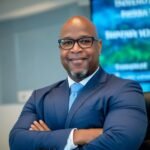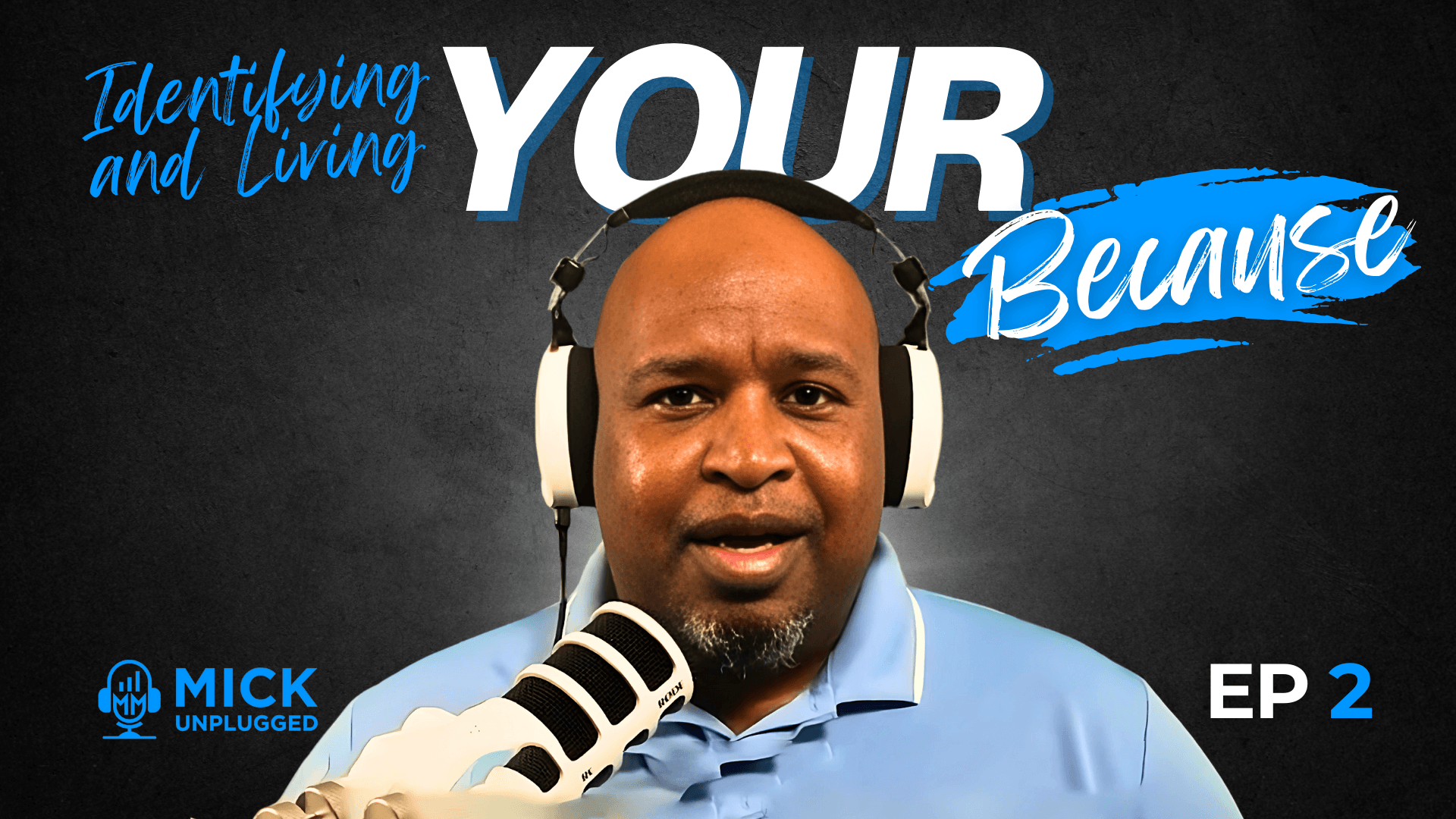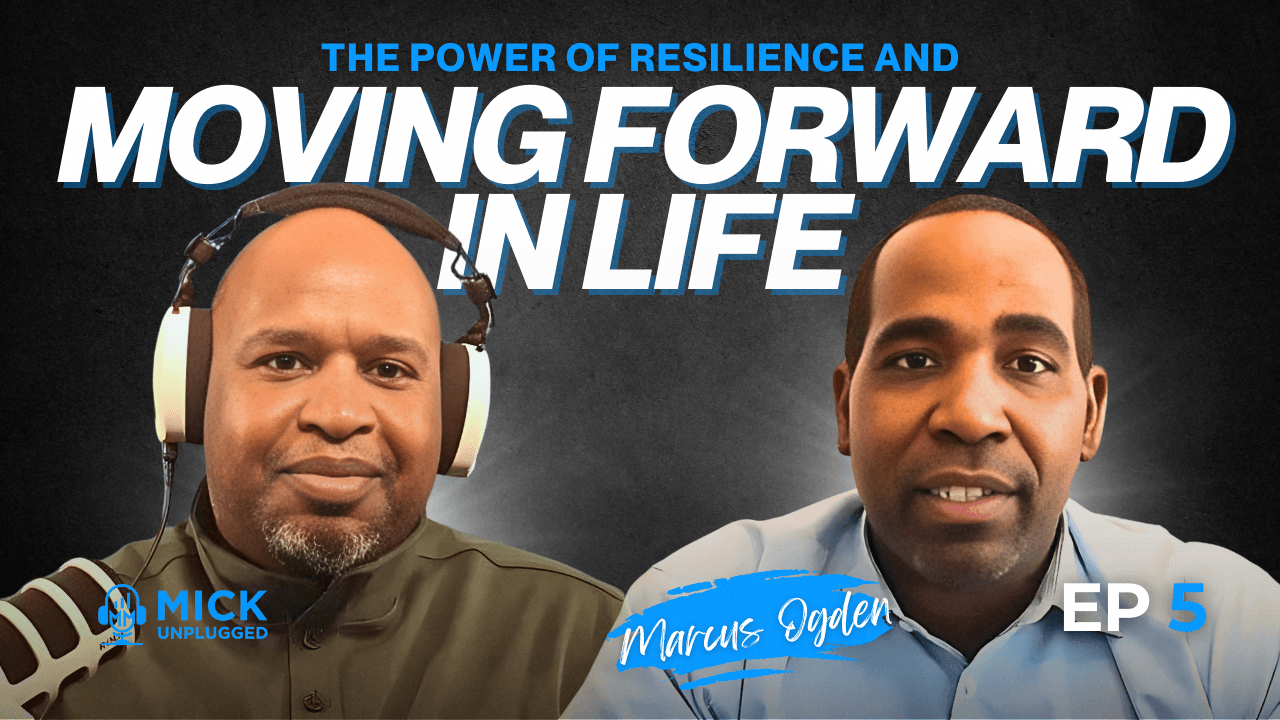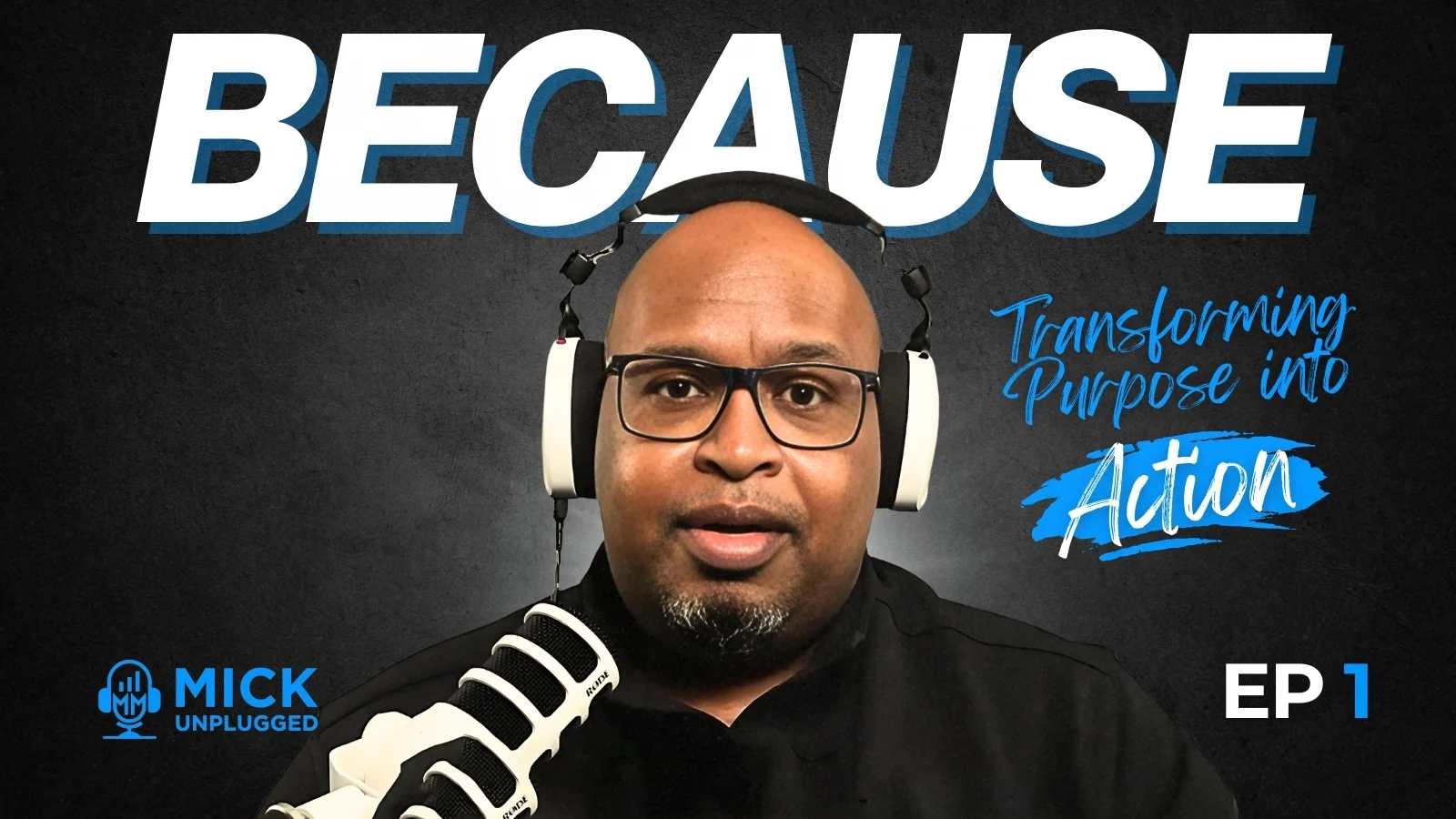Podcast Intro: Are you ready to change your habits, sculpt your destiny, and light up your path to greatness? Welcome to the epicenter of transformation. This is Mick Unplugged. We’ll help you identify your because so you can create a routine that’s not just productive, but powerful. You’ll embrace the art of evolution, adapt strategies to stay ahead of the game, and take a step toward the extraordinary.
So let’s unleash your potential. Now here’s Mick.
Mick Hunt: Ladies and gentlemen, welcome to the next and latest greatest episode of Mick Unplugged. And today, this is personal. We’re talking to one of my goats. As a matter of fact, when I talk to this person, when I text and communicate, I always say, my goat, how are you doing? Ladies and gentlemen, and I have to read this off.
So if you’re watching the video, you’re gonna see me reading because I can’t I can’t miss this. Four time parade all American, McDonald’s all American, high school player of the year, in college consensus first team all American, all ACC, number 2 pick of the 1991 NBA draft, LaFrak City’s finest, my GOAT, mister Kenny Anderson. Kenny, welcome to the show, my brother.
Kenny Anderson: Thanks for having me on, and, it’s a blessing being on here and letting everybody know my my history, where I come from, what I’m doing now, my life is going well, and I appreciate it.
Mick Hunt: I appreciate you back, man. And, you know, we’ve had a lot of talks off offline, and you you know what you mean to me and to my story in my life. So I I truly appreciate you in that. But hearing those accolades, man, like, sometimes do you go back and say, is that really me?
Kenny Anderson: No. Not really. I I started playing basketball at a young age at about 6 years old, but it came to me my freshman year in high school when we won the city championship. I was 15 years old. That’s when it took off for me.
You know, I was that archbishop Malloy High School.
Mick Hunt: Right.
Kenny Anderson: Jack Carroll is my coach. And what was very, unique about that whole situation, I never played the Q1. I only played 3 quarters. It happened fast for me, but it happened the right way for me at the right school. I had mentors, man.
I just had a I had a great team that I listened to, and thank God I was able to overcome all my differences in my life.
Mick Hunt: Man. And and let’s dive into that. Right? Because at McCloud, and you know this about me, Kenny, I’m all about diving deeper than your why. Right?
Like, I think your why is superficial, but there’s a reason that makes us who we are. There’s a reason that propels us forward, and I call that our because. In your illustrious career, you’ve seen a lot. You’ve been through a lot, and now you’re coaching and you’re transforming and inspiring other people to do that. But if we were to look back at your career, it was fueled by more than just talent.
Kenny Anderson: Yeah. It was fueled for more than talent. I was possessed to take care of my mother. I I come from nothing. I remember one day I asked my mentor, Vincent Smith.
I said, I wanna take care of my mother. How can I do that? He said, listen. You go to school. You go to the high school.
Do well in school. Crack the books. Play basketball. And I tell you, you’ll make it. You’ll you’ll be able to take care of your mother.
So I zeroed in on it. I Right. And that’s all I did. Play ball, went to school, and worked out on my game at the Lost Battalion Hall in Queens, New York. Now it’s it’s turning into a shelter now
Mick Hunt: Mhmm.
Kenny Anderson: For for the homeless. So that’s a great thing. That’s a great thing for the homeless. So they have somewhere to put their head and lay down and live it. I’ve been blessed to play the game that I love.
I did my documentary, and my slogan is, basketball is easy. Life is hard. So that’s just that’s just how I came up. I remember growing up, my junior year in high school, one of my best years ever playing basketball, but I got evicted. Me and my mother out of our apartment got evicted that year.
Moved in with my cousin, and my mother used to come see me every morning before I went to school. My life has been, you know, upside down, crazy at times
Mick Hunt: Mhmm.
Kenny Anderson: At times. But it was it was always put together, you know, for my, my beliefs. My belief was, I’m gonna make it out of the ghetto, and by that, play ball, going to school, being a humble person.
Mick Hunt: Right.
Kenny Anderson: My mother taught me that. You know? I don’t care how big I got the game of basketball, but I was always humble.
Mick Hunt: Yes, sir.
Kenny Anderson: Even bragging, joking around, I don’t even know how to do that. I get a little, you know, bothered by doing, you know, just bragging and saying this and that. I don’t even get into that. I just get into you know, I was blessed to play the game I love, and that’s the game of basketball.
Mick Hunt: I get it. I get it. And and one of the things that I love about you and why you know? Again, you you you told me not to talk about Carolina, but even though I went to Carolina and you’re exact, one of the things I loved about Kenny Anderson was this, you worked. Right?
Like a lot of folks have talent. Like there’s people in business that are better than me. Right? Like, I don’t, I don’t have the sharpest of business minds. Like, I, I, I feel like I’m, I’m up there, but I’m not the best.
But no one’s ever gonna outwork me or outthink me, or they’re not gonna be fueled the way that I’m fueled internally. And that’s what made me connect with you at a very young age was I saw that in your face on the basketball court. I was like, there’s something that’s making Kenny Anderson different. Like, what do you think that I I know it’s your mom and the story and the connection.
Kenny Anderson: I know people get tired of me saying, but it was just my mom. I wanted to take care of my mother, so I had to work extremely hard. And this is where the story from 13 to 35. You know? That’s where high school, Jack Curb, Archbishop of Hawaii High School was great.
Georgia Tech, Bobby Crimmins, Kevin Cantwell, Sherman Dillard. Those are my assistant coaches at Georgia Tech. And then it started getting great. That’s where the NBA came in came in, and it was just all about the the business aspect of it. And I never experienced that, so I was just I just wanted to play ball and enjoy my life.
When money gets involved in anything, it gets kinda sticky. So that’s when, it changed me a little bit. And, I was able to take care of my mother, but, you know, I just I just didn’t continue working extremely hard,
Mick Hunt: know,
Kenny Anderson: when I got to the NBA. Kinda tilted it off. I say it. You know? I was able to I was able to do you know, if you if you have much talent as I had, I was able to just cut it on and off.
But most people can’t do that. Right. You know what I mean? Right. In my situation.
But I know I I woulda had a crazy NBA career if I woulda continued to work extremely hard on my craft, which I didn’t a little bit. I didn’t.
Mick Hunt: So here’s what I’m gonna give you some accolades because, you know, I’m left handed. Yeah. My my first jersey number was 7. Well, I always tell people this. Kenny Anderson created the combo point guard.
Like, you were the first one. Like, I remember watching Georgia Tech games. Fast break, most of the time people go in for a layup or jam. Kenny Anderson is pulling up and and shooting a 12 footer on a fast break. Right?
Like like, the the world hadn’t seen that before. Now it’s the norm. Do you feel like you were a trendsetter in that combo guard kinda aspect?
Kenny Anderson: I don’t I don’t know about it was our trendsetter, but this is I just did the drills me and my guy, Vincent Smith, worked on.
Mick Hunt: Right.
Kenny Anderson: So, you know, we we we worked on about the lost battalion hall a lot. The short pull up.
Mick Hunt: Right.
Kenny Anderson: Under the foul. I used to do thousands of shots, thousands with my left hand speed to pull it up. My right hand through middle, side, oh, just constantly constantly. Just working on my game, my craft. That’s just what I did.
And then when I got to college level, my ice it just was, like, automatic because I worked on my game.
Mick Hunt: Yes, sir. Throughout your journey from the the courts in in New York going to Georgia Tech and in the NBA and and even your story. Right? Like, I’ve seen mister Tibbs no lie a 100 times because you’re
Kenny Anderson: my guy. You like it?
Mick Hunt: I love it. I’m giving it a shameless plug. Like, right now, mister Tibbs, everybody go watch it at least 5 times because it’s that gravitating. You went through a lot of challenges, a lot of adversity. What do you think is the most significant challenge that you’ve overcome that’s helped shape who you are today?
Kenny Anderson: Wow. That’s a that’s a tough question. And I really don’t
Mick Hunt: just have one. You have you have a few that you’ve overcome.
Kenny Anderson: Right? A few, but I I just think the the main thing through all everything I’ve been through and all that, I I just remain to be a good person. It’s really simple, but I really can’t put my hands on. You know? I did this.
I did everything went through. I I worked hard. I did the it’s just so so many things were thrown at me. I failed a bunch of times, and I was able to get back up, dust myself off, and work on it. You know?
And and I just thank God that I was able to do that. Even with my health, you know, I was able to rebound from that. The bottom line is it’s gone. I can’t even speak highly of what’s been going on in my life, but I see all the great things that’s going on. It’s because of GOD.
Yeah. God. He’s just helping me out. Yeah. And that was one thing also.
I just stopped, you know, hanging out with certain people, sitting sitting out, thinking a lot, and seeing how people move, and boom. It comes to you when you see that, when you’re able to just sit back and not talk a lot, just listen, you get smarter.
Mick Hunt: And I
Kenny Anderson: and I’ve gotten smarter over the course of years, able to see, you
Mick Hunt: know, who’s
Kenny Anderson: in it for Kenny Anderson and who’s not.
Mick Hunt: You know, I talk all the time about making sure your circle is tight and then all looking at your circle because here’s what I’ve learned in my life. Everyone that’s for you isn’t always for
Kenny Anderson: you. They want the praise and all that for being a part of what you have. Exactly. Gotta be careful that that’s something I deal with early in my life, but now it’s really changed. I’m a little older now.
53. I’ve been through it. So it’s, it’s really tough getting anything off of me now. I love it.
Mick Hunt: I’m the same way. Same way. A couple more questions. I’m a get you out of here because you’ve been gracious with your time. I I hear you talk a lot about the difference in in good and great.
And now that you’re a coach, Right? Like, you have that conversation with your team a lot, the difference in good and great. From the world of Kenny Anderson, what’s the difference between good and great to you?
Kenny Anderson: Good is you just wanna be good at something. You just put the time in every now and then. But great discipline to your time, you know, being disciplined with your time and, going after it. If you wanna be a basketball player, you gotta work on your craft. And I tell all the guy, you gotta you’re in college, so you work at school, get you good grades in basketball.
That’s that’s what you should be doing. That’s what should be on your mind. Just getting better. You shouldn’t be doing all the partying and the drinking and smoking and that’s not gonna get it. And I gotta keep drilling that in these young men head that I’m coaching, mentoring, and, everything.
We just gotta keep working. If you’re serious about playing anywhere in basketball, NBA, overseas, anything, playing college basketball, playing at Fish University, helping the team win, you gotta work on your crab. You gotta work out. Watch what you eat. Watch what you drink.
Watch what you smoke. If you anything, you gotta be more committed. And I say the commitment is the is the big thing. If you’re willing to to put the the work in, it will work. It will work.
It’s time. Patience. Patience is a virtue. You know? My mama taught me that many years, ago.
Patience is a virtue. You just gotta keep working. Keep working. Keep work. And it’ll turn for you.
If you’re doing the right things in life
Mick Hunt: That’s right.
Kenny Anderson: It’s not gonna it’s not gonna be successful. You don’t want that, quick thought of it and stuff like that. You want to sit down and just keep working.
Mick Hunt: Yes, sir. So now the head coach at Fisk Yeah. Right? Teams had a decent year. Yes.
Right? But but you’re doing more than coaching basketball. Right? Because I know you you’re teaching young men about building a future and a legacy because, you know, everybody’s not gonna make it to the league. Everybody’s not gonna make it overseas.
There’s some folks there’s actually a lot of folks that the day that they graduate college or leave Oh. They gotta go get a j o b. How are you helping shape that vision for for the players that you interact
Kenny Anderson: with on it? So that’s that’s mainly I I Finch, I don’t I don’t have you know, you gotta think that no no one is gonna go here and and make it to the league. The NBA is 1% makes it, and then you go overseas that the percentage is probably a little bit higher. But just commit yourself to to life lessons. I I I I give my team my life lessons of how I grew up and everything like that, and, hopefully, it’s it’s helping them grow as human beings.
I’m here for a reason. You know? I’m here at FIST for a reason. These guys, they’ve been great. They’ve been great.
Winning games is half the battle. You know? But, they’re graduating, being a good teammate, being a good citizen to your mother, to your family. That’s the best thing. That’s if I could teach them that, get across to them and get it in their mind, I did my job.
I’m a, you know, real believer here at Fisk. You know, gave me my 1st college job, something I always will remember. Coaching these guys, coaching at FIST, teaching these guys the right way. And we’re having a great year this year. You know?
So it’s it’s a blessing for me to be a part of this and to give them a a helping hand in life Right. In life. Not just athletic. That’s it’s bigger than basketball. I always say that to my team.
It’s bigger than basketball. I’m here for you. I’m here for you for the rest of your life. Call on me. If I can help you, you guarantee I’m gonna help.
My my guys that that I even the young ladies around here, the HBCU, Fitch Universe, if you call on me, if I can help you, I will give you a helping hand. That’s what I’m about, helping others form their their goals in life, whatever that is.
Mick Hunt: Absolutely. And I’m a testament to that because I know how generous you are with me. So, again, I always tell you, I appreciate you more than you know. You don’t know how much you inspire people that aren’t necessarily in your circle, but you your reach is tremendous. And so I appreciate I’m happy for that, man.
I’m gonna get you out of here with a few personal questions.
Kenny Anderson: Okay.
Mick Hunt: First one, why Georgia Tech in North Carolina? The the people wanna know.
Kenny Anderson: Oh, people wanna know. It’s the story I tell all the time. It’s my mother. My mother wanted me to go to Georgia Tech because I believe coach Kribbits. She really believed in coach Kribbits and the Southern Hospitality in Atlanta.
When I first went down, it was awesome. UNC, yeah, a great program. I really wanted to go to Syracuse because of Pearl Washington.
Mick Hunt: Right.
Kenny Anderson: And, my mother was like, nope. I listen to my mother, man. That’s one of the reasons I went to Georgia Tech. You know, I listened to my mother. She was like, you’re going to Georgia Tech.
And I was like, okay. That’s that’s what was that’s what it was all about.
Mick Hunt: Yes, sir. Who was Kenny Anderson’s favorite teammate? College or pro?
Kenny Anderson: College was, Dennis Scott, Brian Oliver, Malcolm Mackey. We we had a, we was all roommates, suite mates. It was great. But my whole team was my in college, Georgia Tech. I love those guys.
Coach Cremins, Kevin Cantwell, Sherman Dillard is now a that, assistant coach at Iowa University. He coached me. That whole program at Georgia Tech when I was there was just a one. It was special.
Mick Hunt: Love it. What about NBA?
Kenny Anderson: NBA, I would say, Rafael Addison. He played with, Syracuse, played with me with the Nets. He was just a good friend. We was awesome together. I really got into in tune with him.
I love Derek Coleman. Was great. Sam Bowie, that that man. The the the first year I went on with, Mookie Blaylock. That whole team was pretty good, but we just couldn’t beat Chicago because of Michael Jordan.
But we had a good team. The NBA for me was another fantastic run. I played for New Jersey Nets, for 4 years, Boston Celtics for 5, Portland Trail Blazers was awesome. Played with Rashid Wallace, Portland in Portland. Jermaine O’Neal, his 1st year coming out from high school to to pro was with Portland.
I played with with him. He was a great young man. NBA, I played with some great shooters. As you know, I always it’s my Chiefs. I played with Dennis Scott, played with Glenn Rice, Dale Carey, Reggie Miller, Tuanze and Petrovic.
Mick Hunt: Yes, sir.
Kenny Anderson: I played with all those guys. I understand the game. You know? Basketball, easy. Life is hard.
Mick Hunt: Yes, sir. You know?
Kenny Anderson: So so NBA was awesome for me, man. I I really enjoyed it. I made the all star team one day in 1994. Yeah. Me and Derek Coleman, we represented the New Jersey Nets.
It was awesome. You know, we we started. So that that tells you something.
Mick Hunt: Right. What was that like? What was your your first all star game like? Like, what was your your thought process going in?
Kenny Anderson: It was
Mick Hunt: And then was it different when you got there with the guys? Yeah.
Kenny Anderson: It was it was snowing. I know we had a a blizzard in Minnesota, and some people got in, some people didn’t. It was it was kinda crazy. I really didn’t think nothing of it. You know?
I just wanted to participate. When I made it, I was so happy, but I made the votes. I made it on votes. So I know you know? I I wasn’t sure.
This is how I was with New Jersey. I don’t know. I just wanted to make it for my fans, and I made I started because of the fans. The coaches, I don’t know about, though. You know?
Some coaches is fake, man. You know? I’m I’m a be real with it. They don’t like you, they won’t put you on the team. So they was out of they was out of the picture.
So the the fans is is a love. Fair. So that that was a blessing for me to make it. Fans was awesome. And they’ve been awesome with me to high school, college, pros.
My fans is awesome, man. I love it.
Mick Hunt: I’m one of them. Yeah. Even though you went to the wrong school, I understand. You were always like, you can ask anyone that knows me. They will tell you, you ask me who my favorite college basketball player of all times, Kenny Anderson, and I went to UNSC.
Kenny Anderson: So I’m glad I’m doing this show for you. And, thank you thank you for just believing in me and just cheering for me and being a fan. That’s awesome.
Mick Hunt: Absolutely. Absolutely. So ladies and gentlemen, my goat, mister Kenny Anderson Kenny, again, appreciate you. Man, you have no idea. We’re gonna get up together because I’m in Nashville quite a bit now, but but can’t wait to do that for those that aren’t following Kenny Anderson, follow.
He’s always dropping words of wisdom. Even though he doesn’t think he’s funny, he’s funny sometimes. And you always see him with his daily Starbucks. What’d you have this morning? What was your Starbucks
Kenny Anderson: this morning? Starbucks. Got it with me, man. Yes, sir. Always I’m Americano.
That’s the strongest coffee with 2, 3 sugars and cream. That’s what I that’s what I get out with.
Mick Hunt: I’m I’m a wimp. I I don’t like hot coffee. Mine is always ice, but I’m always a a iced vanilla latte.
Kenny Anderson: Yeah. Oh, okay. Maybe I’ll get that for you my next time, but I’m always a Americano in the morning. And I now this is the real thing with Starbucks. I I gotta go every morning because, I go.
I meet people in there. We just talk. It’s a great, building block for me, and my wife knows that. Like, I got wherever I’m at, I I said, we gotta find a, Starbucks, and I gotta go in there for at least 30 minutes. So it’s something that happened to me, and I just it grew on me.
Starbucks. Yeah. And I like going in there, talking to people, meeting people, and going over all my stats and all that with my team. I I sit down, and I get my head right. So I’m always at Starbucks for hour and a half to maybe 2, but cut it a half hour if it’s if I’m in another town.
Mick Hunt: Yeah. It’s that zen moment. Right? Like, you have that moment. It’s like, this is me.
This is my world. Yes. Well, Kenny, I appreciate you. For the listeners, you know this. Your because is your superpower.
And like my man Kenny Anderson says, go unleash it.
Podcast Intro: Thanks for listening to Mick Unplugged. We hope this episode helps you take the next step toward the extraordinary and launches a revolution in your life. Don’t forget to rate and review the podcast, and be sure to check us out on YouTube at Mick Unplugged. Remember, stay empowered, stay inspired, and stay unplugged.






